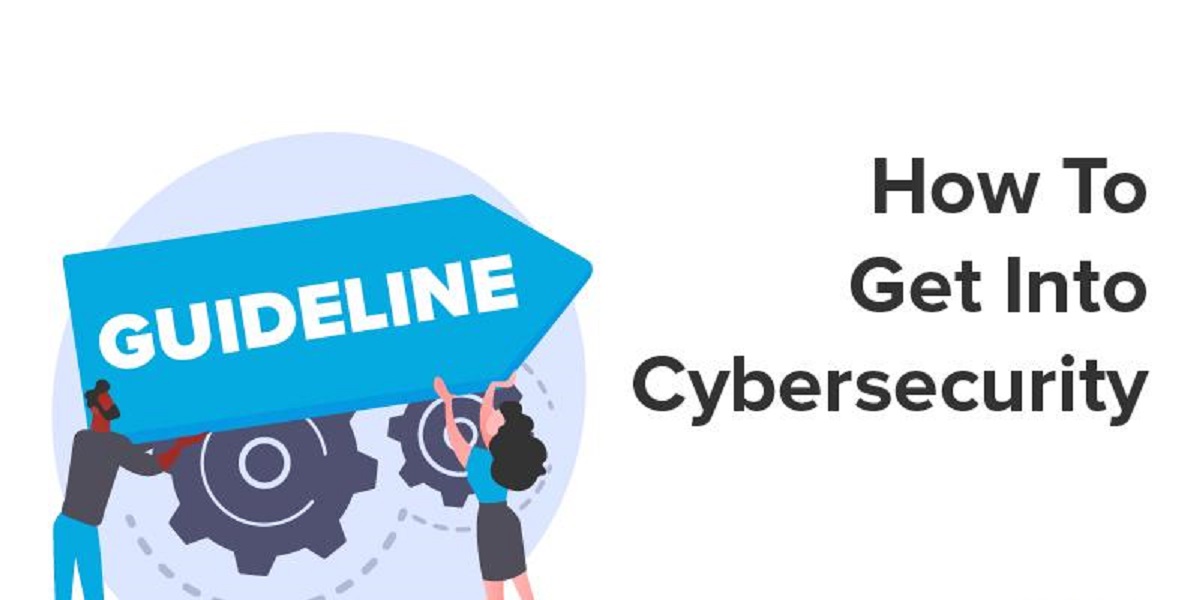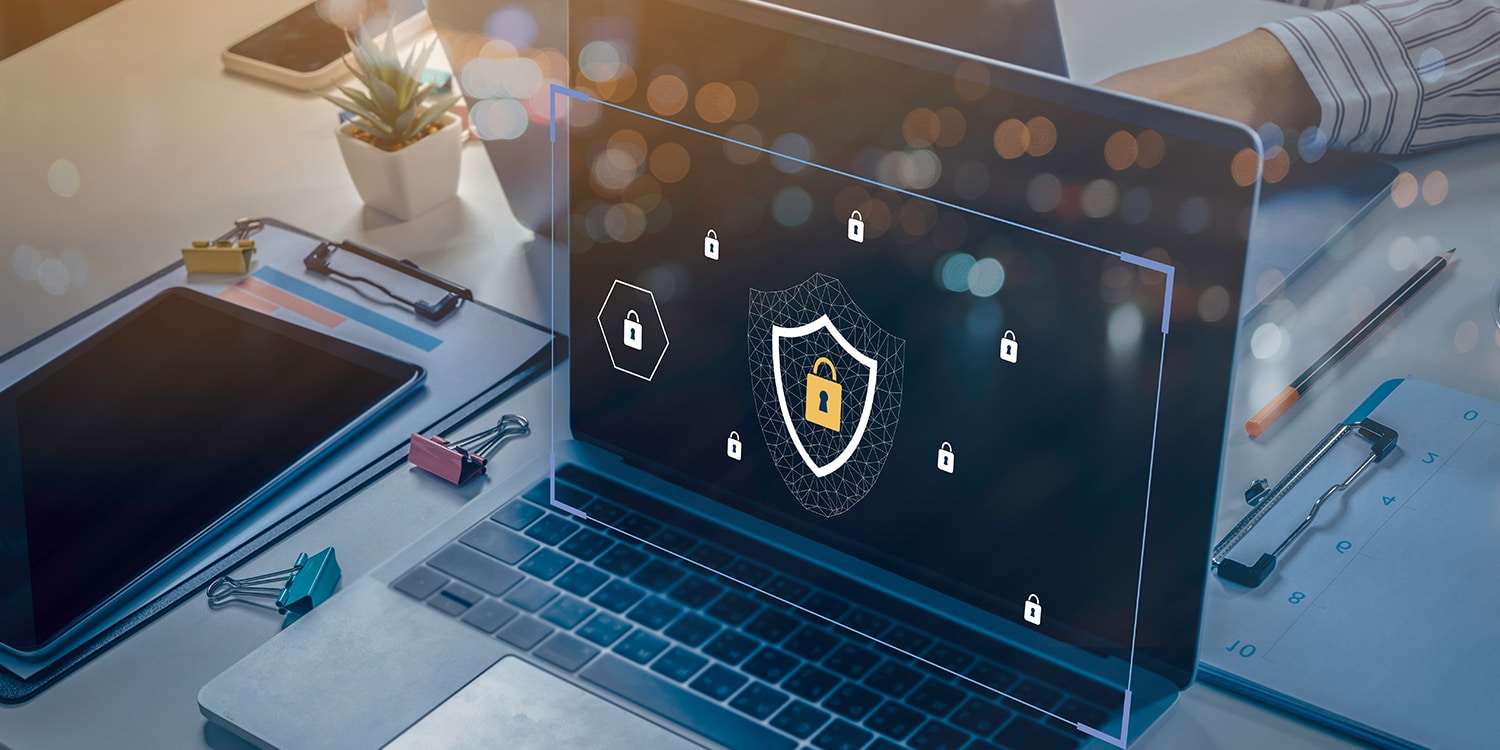Introduction
As technology advances and more aspects of our lives become digitized, the need for cybersecurity has become more critical than ever before. Cybersecurity involves protecting computer systems, networks, and sensitive data from unauthorized access, theft, and damage.
In recent years, cyberattacks have increased in frequency and sophistication, posing significant threats to individuals, businesses, and even governments. These attacks can result in data breaches, financial losses, reputation damage, and even compromise national security. Therefore, the demand for professionals with cybersecurity skills has skyrocketed, providing ample opportunities for those interested in pursuing a career in this field.
But how do you get started in cybersecurity? This article will guide you through the basic concepts of cybersecurity and outline the steps you can take to enter this exciting and in-demand industry.
Before diving into the specifics, it’s important to understand why cybersecurity matters. As our world becomes more interconnected through the Internet of Things (IoT) and cloud computing, the attack surface for cybercriminals continues to expand. Any unprotected device or vulnerable network can become a potential target.
Cybersecurity aims to mitigate these risks by implementing preventive measures, such as firewalls, encryption, and intrusion detection systems, to safeguard information and systems from unauthorized access or malicious activities. It involves not only technical solutions but also a deep understanding of human behavior, risk management, and regulatory compliance.
As we rely more on technology for personal, financial, and business activities, the consequences of a cyberattack can be severe. Cybersecurity professionals play a crucial role in mitigating these risks, ensuring the confidentiality, integrity, and availability of data and systems.
In the next sections, we will explore the fundamental concepts of cybersecurity and outline the steps you can take to enter this exciting field. Whether you have a technical background or not, cybersecurity offers diverse career paths and ample opportunities for growth and innovation.
Why is Cybersecurity Important?
In today’s digitally connected world, where personal and sensitive information is stored and transmitted online, the importance of cybersecurity cannot be overstated. Cybersecurity plays a vital role in safeguarding individuals, businesses, and governments from the ever-evolving threats of cybercrime. Here are some key reasons why cybersecurity is crucial:
1. Protection of Personal Data: With the increasing dependence on online services and e-commerce, individuals entrust their personal data to various platforms. Cybersecurity ensures the confidentiality and privacy of this sensitive information, protecting individuals from identity theft, financial fraud, and other forms of cyberattacks.
2. Safeguarding Business Operations: Businesses of all sizes rely on information systems and technology for their day-to-day operations. Cybersecurity measures help prevent unauthorized access to these systems, ensuring business continuity and protecting valuable assets, intellectual property, and customer data. A cyber attack can paralyze a business, resulting in financial losses and reputational damage.
3. Defense Against Cyber Threats: Cyber threats are constantly evolving, ranging from phishing and malware attacks to ransomware and advanced persistent threats (APTs). Cybersecurity professionals employ various techniques to detect, prevent, and respond to these threats, reducing the risk of data breaches, system compromises, and intellectual property theft.
4. National Security: Governments face significant cyber threats that can disrupt critical infrastructure, compromise national defense, and undermine public safety. Cybersecurity measures are essential for safeguarding national security, protecting government networks, and ensuring the smooth functioning of vital services.
5. Compliance with Regulations and Standards: Many industries are subject to regulations and standards regarding the protection of sensitive data. Cybersecurity helps organizations comply with these requirements, avoiding legal implications, penalties, and damage to their reputation.
6. Trust and Consumer Confidence: A robust cybersecurity framework enhances customer trust and confidence in online transactions and services. By establishing secure systems, organizations can build a positive reputation, attract customers, and foster long-term relationships.
7. Innovation and Technological Advancements: Cybersecurity fosters innovation and technological advancements by enabling secure digital transformations. It allows businesses and individuals to leverage emerging technologies while mitigating the associated risks.
Understanding the importance of cybersecurity provides a compelling motivation for individuals to pursue careers in this field. The need for skilled cybersecurity professionals continues to grow as organizations strive to protect their data, systems, and reputation in an increasingly interconnected and cyber-threatened world.
Basic Concepts of Cybersecurity
To navigate the world of cybersecurity, it is important to familiarize yourself with some basic concepts. Understanding these core principles will provide a solid foundation for further exploration and specialization within the field. Here are a few key concepts in cybersecurity:
1. Confidentiality: Confidentiality refers to the protection of sensitive information from unauthorized access. This involves implementing measures such as encryption and access controls to ensure that only authorized individuals can view and manipulate the data.
2. Integrity: Integrity ensures that data remains unaltered and accurate throughout its lifecycle. It involves implementing mechanisms to detect and prevent unauthorized modifications, whether accidental or malicious, to maintain the trustworthiness of the data.
3. Availability: Availability ensures that data and systems are accessible and usable when needed. It involves implementing measures to prevent and mitigate disruptions, such as denial-of-service attacks or hardware failures, that could impact the availability of critical resources.
4. Authentication: Authentication establishes the identity of individuals or systems accessing resources. It involves verifying credentials, such as usernames and passwords, biometrics, or digital certificates, to ensure that only authorized entities can gain access.
5. Authorization: Authorization determines the level of access granted to authenticated entities. It involves defining and enforcing access control policies that restrict unauthorized activities and limit privileges based on the principle of least privilege.
6. Risk Management: Risk management involves identifying, assessing, and mitigating cybersecurity risks. This includes conducting risk assessments, implementing controls and safeguards, and regularly monitoring and reviewing the effectiveness of these measures.
7. Threats and Vulnerabilities: Threats refer to potential events or actions that can cause harm to information systems or data. Vulnerabilities are weaknesses or flaws that can be exploited by threats. Understanding the different types of threats and vulnerabilities is essential for implementing appropriate defenses.
8. Incident Response: Incident response involves the processes and procedures used to respond to and manage cybersecurity incidents. This includes detecting and containing incidents, conducting forensic analysis, and restoring affected systems to normal operations.
9. Security Awareness: Security awareness involves educating individuals about cybersecurity risks and best practices. This includes providing training on topics such as phishing attacks, social engineering, password hygiene, and safe web browsing to empower individuals to make informed security decisions.
These concepts provide a high-level overview of the fundamental principles in cybersecurity. As you delve deeper into the field, you will encounter more specialized concepts and frameworks that further enhance your understanding and expertise.
Steps to Get Into Cybersecurity
If you’re interested in pursuing a career in cybersecurity, here are some steps you can take to get started on your journey:
- Gain a Foundational Knowledge: Begin by familiarizing yourself with the basics of cybersecurity. Take online courses, read books, and follow reputable cybersecurity blogs and resources to understand the core concepts, terminology, and best practices.
- Choose a Specialization: Cybersecurity offers various specializations, such as network security, ethical hacking, digital forensics, and risk management. Consider your interests and strengths to identify the area you want to specialize in.
- Obtain Relevant Certifications: Certifications validate your knowledge and expertise in specific cybersecurity domains. Leading certifications include CISSP, CompTIA Security+, CEH, and CISM. Research and choose certifications that align with your chosen specialization.
- Build Practical Experience: Practical experience is invaluable in the cybersecurity field. Look for opportunities to gain hands-on experience, such as participating in online capture-the-flag (CTF) competitions, contributing to open-source projects, or undertaking cybersecurity-related internships or co-op positions.
- Network and Join Cybersecurity Communities: Networking is essential in any industry, and cybersecurity is no exception. Engage with cybersecurity professionals through forums, online communities, and social media platforms. Attend industry conferences and meetups to connect with like-minded individuals and expand your professional network.
- Keep Up with Industry Trends and News: The cybersecurity landscape is constantly evolving. Stay informed about the latest threats, vulnerabilities, and cybersecurity trends by regularly reading industry publications and subscribing to cybersecurity newsletters. This will help you stay ahead of emerging threats and technologies.
- Develop Essential Cybersecurity Skills: Enhance your skillset by focusing on developing essential cybersecurity skills. These may include knowledge of operating systems, networking protocols, programming languages, cryptography, and incident response.
- Apply for Internships and Entry-Level Positions: Look for opportunities to gain practical experience in the field by applying for internships and entry-level positions. This will give you real-world exposure to cybersecurity practices and allow you to apply your knowledge in a professional setting.
- Continuously Learn and Update Your Knowledge: Cybersecurity is an ever-evolving field, and it’s crucial to stay up-to-date with the latest trends, technologies, and threats. Engage in continuous learning through online courses, workshops, conferences, and industry certifications.
- Advance Your Career in Cybersecurity: As you gain experience and expertise, you can explore advanced roles in cybersecurity, such as security analyst, penetration tester, security consultant, or security architect. Continuously refine your skills, pursue additional certifications, and seek opportunities for professional growth.
Remember, building a successful career in cybersecurity requires dedication, continuous learning, and staying adaptable in this fast-paced field. By following these steps and immersing yourself in the world of cybersecurity, you can lay the foundation for a rewarding and impactful career.
Gain a Foundational Knowledge
Before delving deeper into the vast realm of cybersecurity, it is essential to build a solid foundational knowledge of the field. This knowledge will serve as the building blocks for your future endeavors in cybersecurity. Here are some key ways to gain a foundational knowledge:
Online Courses: Take advantage of the plethora of online courses that offer comprehensive cybersecurity curriculums. These courses cover a wide range of topics, including network security, cryptography, ethical hacking, and risk management. Platforms like Coursera, Udemy, and edX offer high-quality courses from renowned universities and industry experts.
Books and Publications: Consider reading books and publications written by cybersecurity experts. These resources provide in-depth knowledge about different aspects of cybersecurity and can help you grasp fundamental concepts. Look for books authored by recognized experts in the field and keep up with the latest industry publications.
Cybersecurity Blogs and Websites: Follow reputable cybersecurity blogs and websites that offer insightful articles, tutorials, and industry updates. These resources often cover topics ranging from beginner-friendly content to advanced technical discussions that can enhance your understanding of cybersecurity best practices and emerging trends.
Participate in Online Discussions: Engage in online discussions and forums related to cybersecurity. Platforms like Reddit and Stack Exchange have vibrant communities where cybersecurity professionals and enthusiasts share their knowledge and experiences. Participating in these discussions can provide different perspectives and practical insights that complement your learning.
Practice Labs and Virtual Environments: Hands-on experience is crucial in cybersecurity, and practice labs and virtual environments can provide a safe and controlled space for experimentation. These labs allow you to practice various cybersecurity techniques, such as setting up secure networks, performing penetration testing, and detecting vulnerabilities in simulated environments.
Stay Informed: Cybersecurity is a constantly evolving field, so staying updated with the latest news, trends, and vulnerabilities is essential. Regularly read cybersecurity news websites, subscribe to industry newsletters, and follow influential cybersecurity professionals on social media platforms. This continuous learning approach will help you stay ahead of emerging threats and developments within the cybersecurity landscape.
Gaining a foundational knowledge in cybersecurity is the first step on your journey. It will provide you with a solid understanding of the principles, concepts, and terminology that form the bedrock of this field. As you progress, you can branch out into specialized areas and acquire the specific skills and knowledge necessary for your chosen cybersecurity career path.
Choose a Specialization
As you explore the field of cybersecurity, you’ll discover that it offers a wide range of specializations, each focusing on different aspects of protecting digital systems and information. Choosing a specialization is a crucial step in shaping your cybersecurity career. Here are some common specializations to consider:
Network Security: Network security specialists focus on protecting computer networks from unauthorized access, attacks, and data breaches. They design and implement security measures such as firewalls, intrusion detection systems, and virtual private networks (VPNs) to secure network infrastructure.
Incident Response and Forensics: Incident response and forensics specialists are responsible for handling and investigating security incidents, such as cyberattacks and data breaches. They analyze digital evidence, identify security breaches, and develop strategies to mitigate and prevent future incidents.
Application Security: Application security specialists concentrate on securing software applications and web services. They assess vulnerabilities, conduct code reviews, and implement security measures to ensure that applications are resilient against threats such as cross-site scripting (XSS), injection attacks, and insecure data storage.
Cloud Security: Cloud security specialists focus on securing cloud computing environments and services. They assess cloud infrastructure, configure security controls, and ensure data protection in cloud-based solutions. They also address cloud-specific risks, such as misconfigurations, data breaches, and insider threats.
Penetration Testing: Penetration testers, also known as ethical hackers, conduct authorized simulated cyberattacks to identify vulnerabilities in systems and networks. They assess the security posture of organizations by attempting to exploit weaknesses and provide recommendations to strengthen defenses.
Security Governance and Risk Management: Security governance and risk management professionals develop and implement security policies, assess risks, and ensure compliance with regulations. They create security frameworks, manage security programs, and guide organizations in making informed security decisions.
Secure IoT (Internet of Things): With the proliferation of IoT devices, specialists in secure IoT focus on securing interconnected smart devices from cyber threats. They address unique risks associated with IoT security, such as vulnerabilities in firmware, inadequate authentication, and data privacy concerns.
These are just a few examples of specializations within cybersecurity. It’s important to research and explore different areas to determine which one aligns with your interests, skills, and career goals. Engage in online discussions, talk to professionals in the field, and consider taking courses or attending workshops to gain exposure and practical knowledge in your chosen specialization.
Keep in mind that the cybersecurity landscape is constantly evolving, and new specializations may arise as technology advances and threats evolve. Flexibility and adaptability are essential qualities that can help you stay relevant in the field as you pursue your specialization.
Obtain Relevant Certifications
In the field of cybersecurity, obtaining relevant certifications can significantly enhance your credibility, validate your skills, and increase your job prospects. These certifications demonstrate your expertise in specific areas of cybersecurity and showcase your commitment to professional development. Here are some popular certifications to consider:
Certified Information Systems Security Professional (CISSP): The CISSP certification is one of the most recognized and prestigious certifications in the cybersecurity industry. It covers a wide range of security topics, including risk management, access control, cryptography, and security governance.
CompTIA Security+: The CompTIA Security+ certification is an entry-level certification that provides a solid foundation in cybersecurity best practices. It covers essential security concepts such as network security, risk management, and cryptography.
Certified Ethical Hacker (CEH): The CEH certification focuses on ethical hacking and penetration testing techniques. It equips professionals with the skills to identify vulnerabilities, conduct authorized hacking attempts, and assess the security posture of organizations.
Certified Information Security Manager (CISM): The CISM certification is specifically designed for professionals involved in managing, designing, and assessing an enterprise’s information security program. It focuses on governance, risk management, incident management, and program development.
GIAC Security Essentials (GSEC): The GSEC certification covers a broad range of essential security topics, including network security, access controls, cryptography, and security policies. It validates foundational knowledge and is respected in the cybersecurity industry.
These are just a few examples of certifications available in the cybersecurity field. When choosing a certification, consider your career goals, the requirements of your desired role, and the industry’s demand for specific certifications.
Before pursuing a certification, evaluate the prerequisites, study materials, and exam requirements. Online courses, practice exams, and boot camps can help you prepare for certification exams. Additionally, joining study groups or forums can provide valuable insights and resources to aid in your preparation.
It’s important to note that certifications alone are not a substitute for practical experience or continuous learning. Employers value hands-on skills and a commitment to staying current with emerging technologies and threats. Therefore, certifications should be paired with practical experience, participation in cybersecurity competitions, and ongoing professional development.
Once you obtain certifications, make sure to update your resume, LinkedIn profile, and online professional profiles to highlight your credentials. Certifications can open doors to new career opportunities and may increase your earning potential in the cybersecurity field.
Build Practical Experience
In the field of cybersecurity, practical experience is highly valued by employers and crucial for your professional growth. Building practical experience not only allows you to apply your theoretical knowledge but also provides you with real-world insights and skills. Here are some steps you can take to gain practical experience in cybersecurity:
1. Participate in Capture the Flag (CTF) Competitions: CTF competitions are cybersecurity challenges that simulate real-world scenarios. These competitions test your knowledge and skills in areas such as cryptography, web security, reverse engineering, and network exploitation. Participating in CTFs helps you refine your problem-solving abilities and exposes you to diverse cybersecurity challenges.
2. Contribute to Open-Source Projects: Open-source projects offer opportunities to collaborate with cybersecurity professionals and contribute to real-world projects. Joining open-source projects related to cybersecurity allows you to gain hands-on experience, learn from experienced developers, and showcase your skills to potential employers.
3. Pursue Cybersecurity Internships or Co-op Positions: Look for internships or co-op positions in cybersecurity. These opportunities provide practical, on-the-job experience and allow you to work alongside experienced professionals. Internships provide exposure to various aspects of cybersecurity, such as vulnerability assessments, incident response, and security operations.
4. Create a Home Lab: Setting up a home lab can be an effective way to gain hands-on experience and experiment with different cybersecurity concepts. Build a virtual lab using tools like VMware or VirtualBox and practice setting up virtual networks, identifying vulnerabilities, and implementing different security controls.
5. Seek Mentoring Opportunities: Connect with experienced professionals in the cybersecurity field and seek their guidance and mentorship. Mentors can provide valuable insights, share their experiences, and offer advice on how to navigate your cybersecurity career. This mentorship can enhance your practical knowledge and help you gain industry perspectives.
6. Volunteer for Non-profit Organizations: Many non-profit organizations require assistance with their cybersecurity needs but may lack the resources to hire dedicated professionals. Volunteering your cybersecurity skills to help secure their systems and data not only contributes to a good cause but also allows you to gain practical experience and expand your network.
7. Stay Updated with Security News and Blogs: Keeping up with the latest security news, vulnerabilities, and emerging threats is crucial for building practical experience. Regularly reading security blogs, whitepapers, and attending webinars or conferences will expose you to real-world scenarios and help you understand how cybersecurity measures are applied in different situations.
Building practical experience takes time and commitment. It requires a proactive approach, continuous learning, and a willingness to learn from both successes and failures. As you gain hands-on experience, document your projects and accomplishments to create a portfolio that showcases your practical expertise to potential employers.
Remember, practical experience complements your educational qualifications and certifications, making you a well-rounded cybersecurity professional. Embrace opportunities to apply your knowledge, experiment with different techniques, and learn from real-world scenarios to strengthen your practical skills in the field.
Network and Join Cybersecurity Communities
Networking and connecting with professionals in the cybersecurity field is crucial for your personal and professional growth. By joining cybersecurity communities, you gain access to valuable insights, collective knowledge, and potential career opportunities. Here are some steps to expand your network and join cybersecurity communities:
1. Attend Industry Conferences and Events: Industry conferences and events provide excellent opportunities to connect with like-minded individuals and industry experts. Attend cybersecurity conferences, workshops, and meetups in your area or participate in virtual events. Engage in conversations, ask questions, and establish connections with professionals who share your passion for cybersecurity.
2. Join Online Forums and Discussion Groups: Engage in online forums and discussion groups dedicated to cybersecurity. Platforms like Reddit, Stack Exchange, and specialized cybersecurity forums offer spaces for knowledge-sharing and collaboration. Contribute to discussions, seek advice, and connect with professionals from diverse backgrounds.
3. Engage on Social Media: Follow and interact with cybersecurity professionals, industry leaders, and organizations on social media platforms such as LinkedIn, Twitter, and Instagram. These platforms provide valuable insights, news updates, and opportunities to engage in conversations with experts. Participate in relevant hashtags, share your knowledge, and establish connections.
4. Join Professional Organizations: Explore professional organizations in the cybersecurity industry and become a member. Organizations such as ISC2, ISACA, and OWASP provide access to industry resources, networking events, and professional development opportunities. Membership in these organizations demonstrates your commitment to the field and exposes you to a wider network of professionals.
5. Contribute to Open-Source Projects: Participating in open-source projects related to cybersecurity not only helps you build practical experience but also connects you with a community of passionate individuals. Collaborate with like-minded professionals, share your expertise, and learn from their insights and experiences.
6. Volunteer for Cybersecurity Initiatives: Consider volunteering for cybersecurity initiatives, such as security conferences or local cybersecurity awareness campaigns. Volunteering allows you to meet professionals in the field, contribute to meaningful projects, and expand your network while giving back to the cybersecurity community.
7. Attend Cybersecurity Webinars and Workshops: Webinars and workshops organized by cybersecurity companies, universities, and professional organizations offer opportunities to learn and connect with experts. Participate in these virtual events, ask questions, and engage in discussions with the speakers and other attendees.
Cybersecurity communities provide the support, knowledge sharing, and mentorship necessary for your professional growth. Actively participate, contribute to discussions, and be open to learning from others’ experiences. Networking within cybersecurity communities can lead to valuable connections, job opportunities, and collaborations that will advance your career in this ever-evolving field.
Keep Up with Industry Trends and News
In the rapidly evolving field of cybersecurity, staying informed about the latest industry trends and news is essential to remain effective and relevant. By keeping up with the latest developments, you can anticipate emerging threats, learn about new technologies, and adapt your skills to meet the evolving needs. Here are some strategies to stay abreast of industry trends and news:
1. Subscribe to Cybersecurity Newsletters: Sign up for newsletters from reputable cybersecurity websites, blogs, and organizations. Newsletters provide regular updates on the latest security vulnerabilities, data breaches, industry events, and technology advancements. They are a convenient way to stay informed without investing a large amount of time.
2. Follow Security Blogs and Websites: Follow renowned cybersecurity blogs and websites that publish informative and up-to-date content. These resources often offer in-depth articles, analysis of recent cyber events, tutorials, and interviews with industry experts. Regularly reading such blogs helps you stay current with cybersecurity trends and emerging threats.
3. Engage on Social Media: Follow cybersecurity professionals, industry influencers, and organizations on social media platforms. Twitter, LinkedIn, and specialized cybersecurity communities on platforms like Reddit and Stack Exchange provide real-time updates, discussions, and insights. Engaging on social media allows you to participate in conversations, learn from others, and expand your professional network.
4. Listen to Cybersecurity Podcasts: Podcasts are a convenient way to consume cybersecurity content on-the-go. Some podcasts provide industry insights, interviews with experts, and discussions on current security trends. Subscribing to cybersecurity podcasts allows you to stay informed while commuting, exercising, or during other downtime.
5. Attend Webinars and Virtual Conferences: Webinars and virtual conferences are excellent opportunities to learn from industry experts and participate in discussions. These virtual events cover a wide range of cybersecurity topics and often provide insights into emerging trends, best practices, and case studies. Participating in such events helps you gain insights and network with professionals worldwide.
6. Join Professional Associations and Forums: Joining professional associations and forums dedicated to cybersecurity provides access to resources, webinars, and discussion forums. Associations like ISC2, ISACA, and industry-specific forums host webinars, conferences, and online communities that allow you to network, share knowledge, and stay informed about industry trends.
7. Read Industry Reports and Surveys: Industry reports and surveys conducted by reputable cybersecurity organizations and research firms provide valuable insights into the current state of the industry. These reports highlight emerging threats, trends, and best practices. By reading these reports, you gain a deeper understanding of the cybersecurity landscape.
Staying informed about industry trends and news is an ongoing process. Dedicate time each week to immerse yourself in cybersecurity resources and explore new developments. By adopting these practices, you will position yourself as a knowledgeable and adaptable professional in the dynamic world of cybersecurity.
Develop Essential Cybersecurity Skills
To succeed in the field of cybersecurity, it is essential to develop a strong set of skills that are in demand within the industry. These skills will enable you to effectively protect systems and data from cyber threats. Here are some critical cybersecurity skills to focus on:
1. Knowledge of Operating Systems: Understand various operating systems such as Windows, Linux, and macOS. This includes knowledge of system architecture, permissions, and security features specific to each platform.
2. Networking: Gain a solid foundation in networking protocols, firewalls, routers, and network security principles. Understanding network infrastructure and how data flows through networks is fundamental to identifying and mitigating network-based attacks.
3. Programming: Learn programming languages such as Python, Java, or C/C++. This skill is essential for scripting, automation, analyzing vulnerabilities, and developing security tools or scripts.
4. Cryptography: Familiarize yourself with encryption algorithms, cryptographic protocols, and cryptographic key management. Understanding cryptography helps in securing data, ensuring privacy, and validating the integrity of information.
5. Incident Handling and Response: Acquire knowledge of incident handling processes, forensic analysis techniques, and incident response best practices. This skill is essential for detecting, investigating, and mitigating security incidents.
6. Risk Assessment and Management: Learn how to assess and manage risks in cybersecurity. This includes understanding risk assessment methodologies, threat modeling, and implementing risk mitigation strategies.
7. Security Frameworks and Compliance: Familiarize yourself with common security frameworks such as NIST Cybersecurity Framework, ISO 27001, and GDPR. Understanding these frameworks helps organizations establish robust security programs and comply with industry regulations.
8. Web Application Security: Develop skills in securing web applications, understanding common web vulnerabilities (e.g., Cross-Site Scripting, SQL Injection), and implementing secure coding practices.
9. Analytical Thinking and Problem Solving: Cultivate your ability to think critically and analytically. Cybersecurity professionals need to analyze complex scenarios, identify vulnerabilities, and formulate effective solutions to mitigate risks.
10. Communication and Collaboration: Effective communication and collaboration skills are essential in cybersecurity roles. Cybersecurity professionals need to communicate technical information to non-technical stakeholders, work in cross-functional teams, and collaborate to solve complex security challenges.
To develop these skills, leverage a combination of formal education, hands-on practice, and continuous learning. Engage in online courses, attend workshops, and participate in cybersecurity competitions to enhance your knowledge and practical abilities. Additionally, actively seek out opportunities to apply your skills in real-world scenarios through internships, open-source projects, or volunteering initiatives.
Remember, developing cybersecurity skills is an ongoing process. Stay up-to-date with the latest technologies, trends, and threats in the field. By continuously building and refining your skillset, you will be equipped to address the ever-evolving challenges in the cybersecurity landscape.
Apply for Internships and Entry-Level Positions
Internships and entry-level positions provide invaluable opportunities to gain practical experience, learn from experienced professionals, and kick-start your cybersecurity career. Applying for these roles allows you to apply your knowledge in a real-world setting, develop essential skills, and establish a professional network within the industry. Here are some steps to help you secure internships and entry-level positions in cybersecurity:
1. Prepare Your Resume: Tailor your resume to highlight relevant coursework, certifications, and any previous experience or projects related to cybersecurity. Emphasize technical skills, problem-solving abilities, and any exposure to industry tools or technologies. Highlight your passion for cybersecurity and your eagerness to learn and contribute to the field.
2. Build a Strong Cover Letter: Craft a compelling cover letter that showcases your motivation and enthusiasm for entering the cybersecurity field. Explain your interest in the specific company or position and how your skills and experiences align with their needs. Demonstrate your willingness to learn, adapt, and contribute to the organization.
3. Research Companies and Position Requirements: Conduct thorough research on companies that offer internships or entry-level positions in cybersecurity. Understand their mission, values, and the specific skills they seek in candidates. Tailor your application materials to align with the requirements of each company, highlighting how your skills and experiences make you a strong fit.
4. Leverage Your Network: Reach out to contacts within the cybersecurity industry, such as professors, mentors, or professionals you’ve connected with through networking events or online communities. Inform them of your career aspirations and ask if they can provide guidance, recommendations, or referrals for relevant opportunities.
5. Attend Career Fairs and Information Sessions: Career fairs and information sessions provide opportunities to meet employers and learn about available cybersecurity positions. Dress professionally, bring copies of your resume, and engage in conversations with representatives from companies that align with your career goals. Make a lasting impression by asking thoughtful questions and expressing your genuine interest in their organization.
6. Apply to Job Boards and Company Websites: Regularly check job boards and company websites for internships and entry-level positions in cybersecurity. LinkedIn, Indeed, and specialized cybersecurity job boards are good resources to find relevant opportunities. Customize your application materials for each position you apply to, highlighting the specific skills and experiences that make you a strong candidate.
7. Embrace Informational Interviews: Request informational interviews with cybersecurity professionals to learn more about their career paths and gain insights into the industry. Be prepared with thoughtful questions, express your genuine interest, and make a positive impression. These conversations can open doors to mentorship, referrals, or future job opportunities.
8. Be Positive and Persistent: Landing an internship or entry-level position in cybersecurity may take time and perseverance. Stay positive, even if you face rejections along the way. Seek feedback on your application materials and interview performance, and use it to improve for future opportunities. Keep learning, expanding your skillset, and ever-increasing your knowledge of the industry.
Internships and entry-level positions provide a stepping stone to a successful career in cybersecurity. Embrace these opportunities to not only develop your skills but also establish a strong foundation and network within the industry. With dedication, persistence, and a willingness to learn, you’ll be on your way to building a rewarding career in this essential and ever-growing field.
Continuously Learn and Update Your Knowledge
In the rapidly evolving field of cybersecurity, continuous learning is paramount to stay ahead of emerging threats and technologies. As the cybersecurity landscape evolves, it is essential to continually update your knowledge and skills to maintain your effectiveness and adapt to new challenges. Here are some strategies to ensure continuous learning and knowledge updates:
1. Stay Current with Industry News: Keep up with the latest trends, vulnerabilities, and best practices by regularly reading cybersecurity news sources, blogs, research papers, and industry reports. Subscribe to reputable cybersecurity newsletters and follow influential figures in the field on social media platforms.
2. Pursue Professional Development Opportunities: Engage in ongoing professional development by attending webinars, workshops, and conferences. These events offer opportunities to learn from industry experts, gain insights into cutting-edge technologies, and network with cybersecurity professionals.
3. Join Online Learning Platforms: Enroll in online learning platforms such as Coursera, Udemy, or edX to access a wide range of cybersecurity courses. These platforms offer courses that cover various topics, including network security, ethical hacking, digital forensics, and secure coding.
4. Participate in Web-Based Capture the Flag (CTF) Competitions: Engage in web-based CTF competitions to challenge and refine your skills. CTF competitions offer practical scenarios that allow you to put your knowledge into action while learning from others and developing problem-solving abilities.
5. Expand Your Network: Connect and collaborate with other cybersecurity professionals through networking events, online forums, and professional associations. Engaging with like-minded individuals allows for knowledge-sharing, brainstorming, and staying informed about new insights and techniques.
6. Join Cybersecurity Communities: Become an active participant in cybersecurity communities and discussion groups. Engaging in meaningful discussions, sharing insights, and seeking advice from experienced professionals can broaden your understanding of the field and expose you to diverse perspectives.
7. Explore Hands-On Practice: Develop practical skills by working on cybersecurity projects, contributing to open-source software, or setting up a home lab environment. By applying your knowledge in real-world scenarios, you deepen your understanding of concepts and gain practical experience.
8. Obtain Advanced Certifications: Continually evaluate and pursue advanced certifications that align with your career goals and the evolving needs of the industry. Advanced certifications enable you to deepen your knowledge in specific areas and demonstrate your expertise to potential employers.
9. Engage in Cross-Disciplinary Learning: Explore and learn from related disciplines such as data privacy, cloud computing, artificial intelligence, and DevOps. By understanding the intersection of cybersecurity with other domains, you can adapt to the evolving complexity of modern technology landscapes.
10. Cultivate a Curious and Learning Mindset: Approach cybersecurity with a curiosity-driven mindset and a hunger for knowledge. Embrace new challenges, ask questions, and seek opportunities to expand your understanding of different cybersecurity domains and technologies.
Continuous learning is a lifelong journey in the field of cybersecurity. Embrace the evolving nature of the industry, and commit yourself to remaining current with the latest advancements, threats, and best practices. By continuously updating your knowledge, you will enhance your skills, improve your problem-solving abilities, and position yourself as a valuable asset in the ever-changing landscape of cybersecurity.
Advance Your Career in Cybersecurity
As you gain experience and expertise in the field of cybersecurity, you may aspire to advance your career and take on more challenging roles. Advancement in cybersecurity requires continuous learning, networking, and a strategic approach to career development. Here are some strategies to help you advance your career in cybersecurity:
1. Identify Your Career Path: Determine the career path you want to pursue in cybersecurity. Whether you aspire to become a security analyst, incident response specialist, penetration tester, or cybersecurity manager, having a clear vision of your goals will help you focus your efforts and seek relevant opportunities.
2. Pursue Advanced Certifications: Look for advanced certifications that align with your career goals and the specific expertise you want to develop. Certifications such as Certified Information Systems Security Professional (CISSP), Certified Ethical Hacker (CEH), or Certified Information Security Manager (CISM) can enhance your credibility and open doors to more senior roles.
3. Seek Leadership and Management Roles: As your experience grows, consider transitioning into leadership or management roles within cybersecurity. Develop your leadership skills, demonstrate your ability to guide and mentor others, and seek opportunities to showcase your managerial capabilities.
4. Continue Learning and Stay Updated: The field of cybersecurity is constantly evolving, so staying updated with the latest technologies, threats, and defense mechanisms is essential. Engage in continuous learning through advanced courses, webinars, conferences, and research to deepen your expertise and adapt to emerging trends.
5. Expand Your Technical Skills: Embrace new technologies and develop expertise in specialized areas such as cloud security, application security, or data privacy. Expanding your technical skills demonstrates your versatility and enables you to tackle advanced cybersecurity challenges.
6. Build a Professional Network: Cultivate relationships with cybersecurity professionals, both within and outside your organization. Attend industry events, join professional associations, and participate in online communities to expand your network. Networking provides opportunities for mentorship, finding new job openings, and collaborating on projects.
7. Contribute to the Cybersecurity Community: Share your knowledge and expertise by writing articles, presenting at conferences, or participating in industry panels. Contributing to the cybersecurity community elevates your professional profile, establishes you as an industry expert, and enhances your credibility.
8. Develop Soft Skills: Alongside technical skills, emphasize the development of soft skills such as communication, leadership, and problem-solving. These skills are increasingly important for successful collaboration, effective risk management, and cross-team coordination.
9. Seek Professional Growth Opportunities: Proactively seek out opportunities for professional growth within your organization, such as taking on new projects, leading initiatives, or participating in cross-functional teams. Identifying and seizing growth opportunities can accelerate your career progression.
10. Embrace Lifelong Learning: Cultivate a mindset of continuous improvement and embrace lifelong learning. Stay curious, seek out new challenges, and be open to acquiring new knowledge and skills throughout your career. Adopting a growth mindset will foster your professional development.
Advancing your career in cybersecurity requires a combination of technical expertise, continuous learning, networking, and seizing opportunities as they arise. By staying committed to professional growth and remaining adaptable within this dynamic field, you can pave the way for a rewarding and successful cybersecurity career.
Conclusion
Cybersecurity is a rapidly growing and ever-evolving field with immense opportunities for individuals passionate about protecting digital systems and information. As outlined in this guide, there are several key steps to follow in order to pursue a career in cybersecurity.
Start by gaining a foundational knowledge of cybersecurity concepts, principles, and best practices. This knowledge will be the bedrock upon which you build your expertise. From there, it’s important to choose a specialization that aligns with your interests and skillset.
Obtaining relevant certifications can enhance your credibility and validate your knowledge in specific areas of cybersecurity. Building practical experience through internships, open-source projects, and volunteering can provide valuable hands-on skills and industry exposure.
Networking and joining cybersecurity communities allow you to connect with professionals, share knowledge, and explore new opportunities. Continuous learning is essential to stay current with industry trends, emerging threats, and new technologies.
Further, developing essential cybersecurity skills, such as knowledge of operating systems, networking, cryptography, and incident response, will position you as a well-rounded professional.
Applying for internships and entry-level positions provides an excellent gateway to the cybersecurity industry, allowing you to gain practical experience and establish a professional network.
As you progress in your career, continually seek opportunities for advancement, whether through certifications, expanding your technical skills, or transitioning into leadership roles.
By embracing a mindset of continuous learning, staying updated with the latest industry trends, and consistently honing your skills, you can pave the way for a successful and fulfilling career in cybersecurity.
Remember, cybersecurity is a dynamic and challenging field that requires dedication, curiosity, and adaptability. Embrace the journey, remain lifelong learners, and contribute to the ever-evolving world of cybersecurity. Your commitment to protecting digital assets and mitigating cyber threats is essential in safeguarding our digital future.

























